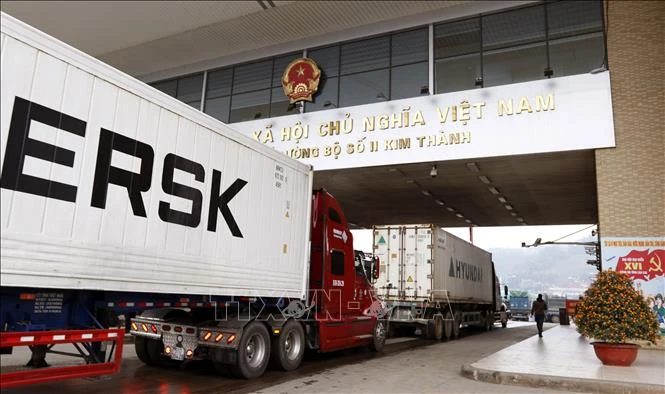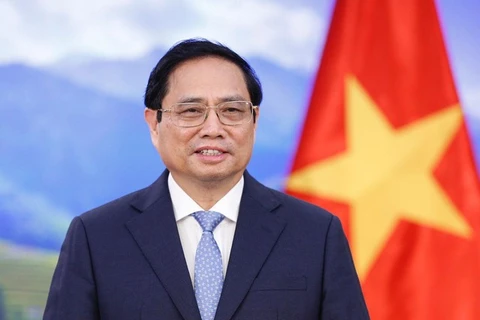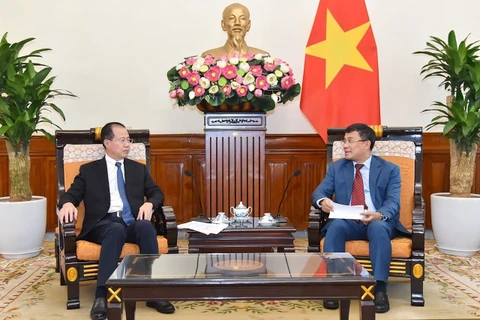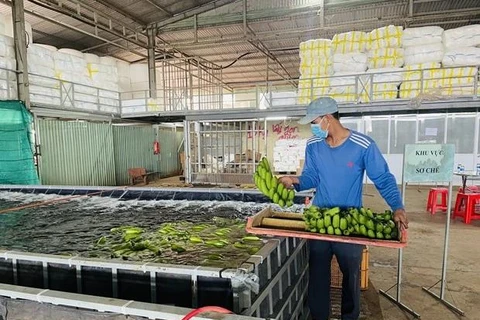
Hanoi (VNA) – Over the past 74 years, friendship and cooperation have been the mainstream of the relations between Vietnam and China.
China was the first country with which Vietnam set up the comprehensive strategic cooperative partnership in 2008, the highest collaboration framework between Vietnam and a foreign country.
Notably, China remains Vietnam's largest trade partner and second largest export market. Meanwhile, Vietnam is China's largest trade partner in the Association of Southeast Asian Nations (ASEAN) and the fifth biggest in the world.
According the General Department of Vietnam Customs, two-way trade in 2023 reached 171.9 billion USD, down 2.6% from the previous year. In the first five months of this year, the value stood at 77.5 billion USD, up 25.4% year-on-year, with Vietnam running a trade deficit of 32.3 billion USD, up 56.3%.
Vietnam’s main exports to China include mobile phones, electronic components, rubber, and agricultural and aquatic products.
Its imports are machinery, equipment, materials for garment-textile and leather shoes production, iron and steel, construction materials, and daily items, among others.
Over the past time, the two countries have signed many bilateral and multilateral agreements such as the ASEAN-China Free Trade Area (ACFTA) and the Regional Comprehensive Economic Partnership (RCEP). China is accelerating its accession to the Comprehensive and Progressive Agreement for Trans-Pacific Partnership (CPTPP), to which Vietnam is a member.
China has become one of the most important markets for Vietnamese agro-forestry-aquatic products.
Statistics by the Vietnamese Ministry of Agriculture and Rural Development show that as of December 2023, Vietnam had exported 16 agricultural products to the neighbouring country, namely banana, durian, mangosteen, black jelly, rice bran, rice, sweet potato, watermelon, dragon fruit, mango, jackfruit, longan, lychee, rambutan, chili, and passion fruit.
After five years of negotiations, the first batches of Vietnamese bird's nest products have been officially shipped to China.
Over the past time, the Vietnamese Government, the Ministry of Industry and Trade and other ministries and agencies have stepped up negotiations to boost exports to China.
Many Chinese enterprises have highly valued Vietnam’s investment environment and set up their factories in the country.
More than 4,000 members of the Business Association of China in Vietnam are operating across the Southeast Asian nation, said its Chairman Gu Chaoqing, highlighting the country’s attractive investment environment, and open, transparent investment policies.
Nong Duc Lai, Trade Counselor of the Vietnamese Embassy in China, noted that bilateral trade increased 8-fold over the past 15 years, and China’s investment in Vietnam jumped nearly 10 places, while their potential for cooperation remains huge.
Vietnamese Minister of Industry and Trade Nguyen Hong Dien and Chinese Chinese Minister of Commerce Wang Wentao shared their view on the good economic-trade ties, which they called, a bright spot of the bilateral relations.
They discussed orientations to enhance the economic-trade ties in a stable, balanced and sustainable fashion in the time ahead./.






















